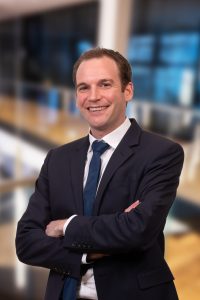Dr. Daniel Schmitz is Team Leader and Sales Manager for Data Centres at GOLDBECK. He is a speaker at this year’s Data Center Expert Summit and talks in advance in an interview with the eco Association about waste heat recovery from data centres, the acceleration of planning and approval procedures and sustainable data centres.
How can neighbourhood developments and data centre projects be combined in an economically sensible way?
From the outset, neighbourhood or campus developments depend on the parties involved working together in partnership. Municipalities, project developers, energy service providers, planning and construction partners (such as GOLDBECK) and users must jointly define their requirements in order to develop an effective concept and take measures that are appropriate for the target group. The various topics must be considered holistically and in a life cycle-oriented manner.
What specifically needs to be considered to ensure that the waste heat from data centres can be used efficiently in residential or commercial buildings?
This depends on the situation. If there are direct heat consumers in the vicinity, such as production plants, or indirect consumers, such as local or district heating networks, the waste heat from a data centre can be made available to the surrounding area using efficient heat pump technology. However, the challenge here is usually the large temperature differences (output temperature vs. network temperature), so that these measures are often not economically viable. In contrast, in the case of neighbourhood developments in greenfield areas, the amount and temperatures of waste heat can be matched to the demand of the other buildings in order to achieve an efficient energy concept.
How can planning and approval procedures be accelerated without compromising on quality and safety?
In my opinion, the acceleration of the planning and approval processes can only work through early cooperation and a timely alignment of interests. This is where it is best if the project developers approach the municipality with an idea and a concrete solution and present it in detail, so that all project partners can adapt to the project. It is also important to have clear agreements and definitions of interfaces and responsibilities so that the planning and approval process can run smoothly. To speed up the planning and construction processes, systematised processes and construction methods based on fixed performance targets should be used.
What innovative concepts are currently available for the sustainable construction of data centres, particularly with regard to energy efficiency?
In my opinion, we are currently facing a transformation process in the field of refrigeration technology. Air-cooled systems with relatively low waste heat temperatures will continue to exist in the future. In the next few years, there will also be an increasing number of hybrid systems in which air-cooled and liquid-cooled systems can be combined. This will enable the use of higher-performance servers on the one hand and higher waste heat temperatures on the other, which in turn can be transferred to available heat consumers with a higher degree of efficiency. In addition, I am convinced that developments in the field of energy storage in the form of efficient heat storage will continue to advance.
What role do life cycle considerations and recycling concepts play in the operation of sustainable data centres?
The life cycle approach plays a prominent role in all real estate developments. Both efficient and resource-saving planning and the use of the most streamlined components possible ensure that the building is constructed in a sustainable manner. For example, recycled building materials (Goldbeck Blue Concrete, green steel, etc.) can also be used here. In turn, a building technology that is optimally adapted to the demand ensures a high level of economic efficiency and an efficient use of resources in the operating phase. The convertibility and deconstructability of data centres should already be taken into account in the planning. Thus, building materials are to be used that can be reclaimed during deconstruction and reused in accordance with the Closed Substance Cycle and Waste Management Act, and do not have to be disposed of as hazardous waste.
Dr. Daniel Schmitz is one of the many expert speakers at this year’s Data Center Expert Summit on 5th & 6th May 2025, in Mainz, Germany. This is a Geman-language event.




